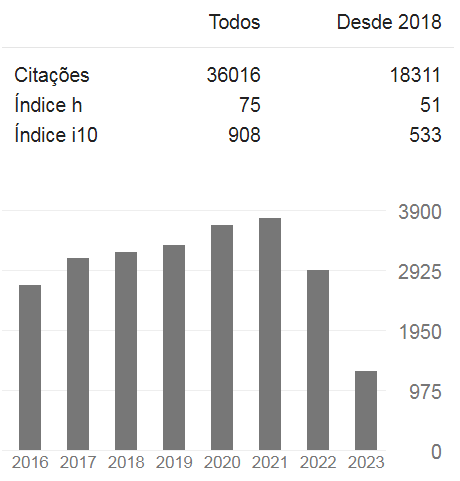Social representations of mothers and parents on children with cerebral palsy
DOI:
https://doi.org/10.5935/1415-2762.20200047Keywords:
Cerebral Palsy, Mothers, Fathers, Child, FamilyAbstract
Objectives: the diagnosis and prognosis of cerebral palsy arouses intense feelings in the family, due to the fact that they have to deal with a special child, which makes this confrontation a delicate and difficult period. The present work aimed to understand the representations of mothers and fathers about the child with cerebral palsy. Materials and Methods: it is a qualitative research based on the procedural approach of the theory of social representations. Were used: the technique of drawing-story with theme; the focus group; and the semistructured interview, with 19 participants. Results: the data were processed using the technique of thematic content analysis and analysis of the graphics of the drawings, with subsequent triangulation of the data. The image categories of the special child emerged; learning and practices of mothers and fathers; identity function of the recognition of the group of belonging. Conclusion: mothers and fathers of the researched social group materialize their representations about children with cerebral palsy in the care they provide, in the different modes of communication between the family and the child, which becomes a facilitator so that mothers and fathers can both learn and attend your child's needs. It was possible to perceive the manifestations of care, of learning in the support networks that are formed, of belonging to the studied social group.
References
Milbrath VM, Siqueira HCH, Motta MGC, Amestoy SC. Família da criança com paralisia cerebral: percepção sobre as orientações da equipe de saúde. Texto Contexto Enferm. 2012[citado em 2019 out. 07];21(4):921-8. Disponível em: doi: 10.1590/S0104-07072012000400024
Simões CC, Silva L, Santos MR, Misko MD, Bousso RS. A experiência dos pais no cuidado dos filhos com paralisia cerebral. Rev Eletrônica Enferm. 2013[citado em 2015 out. 07];15(1):138-45. Disponível em: http://dx.doi.org/10.5216/ree.v15i1.13464
Dantas MSA, Collet N, Moura FM, Torquato IMB. Impacto do diagnóstico de paralisia cerebral para a família. Texto Contexto Enferm. 2010[citado em 2019 ago 13];19(2):229-37. Disponível em: doi:10.1590/S0104-07072010000200003
Baltor MRR, Dupas G. Experiências de famílias de crianças com paralisia cerebral em contexto de vulnerabilidade social. Rev Latino-Am Enferm. 2013[citado em 2019 fev 12];21(4):956-63. Disponível em: doi: 10.1590/S0104-11692013000400018
Jodelet D. As representações sociais. Rio de Janeiro: UFRJ; 2001.
Moscovici S. Representações sociais: investigações em Psicologia Social. 7ª ed. Petrópolis: Vozes; 2010.
Ronchi JP, Avellar LZ. Família e ciclo vital: a fase de aquisição. Psicol Rev. 2011[citado em 2019 maio 15];17(2):211-25. Disponível em: doi: 10.5752/P.1678-9563.2011v17n2p211
Borelli-Vincent M. L’expression des conflits dans Ie dessin de la famille. Rev Neuro-Psychiatr Infant. 1965; 13(2):45-66.
Bardin L. Análise de conteúdo. 4ª ed. Lisboa: Edições 70; 2011.
Minayo MCS, Assis SG, Souza ER, editors. Avaliação por triangulação de métodos: abordagem de programas sociais. Rio de Janeiro: Fiocruz; 2010.
Moscovici S. Representações sociais: investigações em Psicologia Social. Rio de Janeiro: Vozes; 2003.
Jodelet D. Représentations sociales: un domaine en expansion. In: Jodelet A, editor. Les représentations sociales. Paris: P.U.F.; 1993. p. 31-61.
Azevedo EC, Moreira MC. Psiquismo fetal: um olhar psicanalítico. Diaphora. 2012[citado em 2019 jan. 12];12(2):64-9. Disponível em: http://www.sprgs.org.br/diaphora/ojs/index.php/diaphora/article/view/73/73
Telles JCCP, Sei MB, Arruda SLS. Comunicação silenciosa mãe-bebê na visão winnicottiana: reflexões teórico-clínicas. Aletheia. 2010[citado em 2019 jan. 12];33(1):109-22. Disponível em: http://pepsic.bvsalud.org/scielo.php?script=sci_arttext&pid=S1413-03942010000300010
Henn CG, Sifuentes M. Paternidade no contexto das necessidades especiais: revisão sistemática da literatura. Paidéia. 2012[citado em 2019 jan. 12];22(51):131-9. Disponível em: http://www.scielo.br/pdf/paideia/v22n51/15.pdf
Coutinho MPL. Depressão infantil e representação social. São Paulo: Universitária; 2012.
Jovcheliovitch S. Vivendo a vida com os outros: intersubjetividade, espaço público e representações sociais. In: Guareschi P, Jovchelovitch S. Textos em representações sociais. Petrópolis: Vozes; 1999. p. 63-85.
Downloads
Published
Issue
Section
License
Copyright (c) 2020 Reme: Revista Mineira de Enfermagem

This work is licensed under a Creative Commons Attribution 4.0 International License.






































